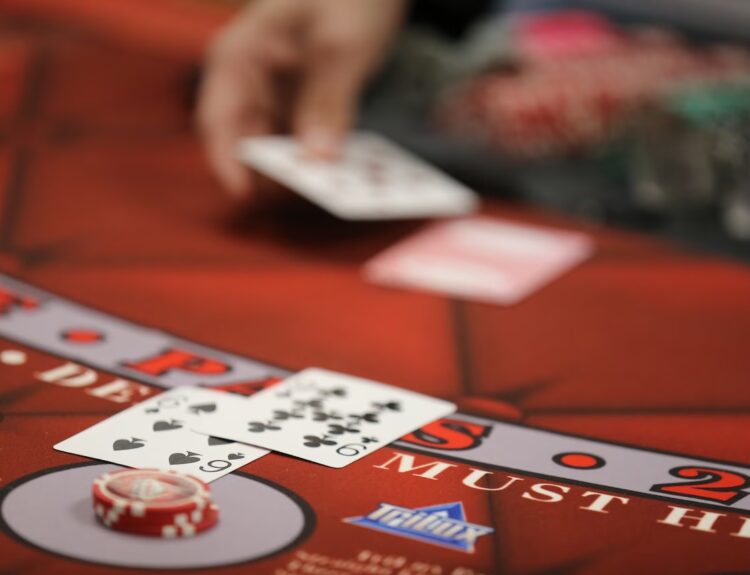When it comes to comparing casino games, few debates are as interesting as Poker vs Baccarat. Both are iconic table games, but they operate on entirely different principles. Poker is often celebrated as a game of strategy, skill, and psychology, while Baccarat is traditionally viewed as a game of chance driven by fixed rules and probability. Yet, the reality is far more nuanced. Understanding the mechanics, strategies, and decision-making processes behind both can reveal which truly demands more player skill and which leans more on luck.
Understanding the Core Differences
While both games are popular in casinos around the world, Poker and Baccarat cater to completely different player mindsets. To understand which is more skill-based, we must first look at their underlying structures.
What is Poker?
Poker is a family of card games that blend skill, psychology, and probability. Whether it’s Texas Hold’em, Omaha, or Seven Card Stud, the core of poker revolves around players competing against each other, not the house. The objective is to form the best hand or convince others to fold through betting strategies and psychological manipulation.
Each round requires critical thinking, reading opponents, calculating odds, and making decisions under uncertainty. Winning consistently in poker depends on long-term skill, bankroll management, and emotional control.
What is Baccarat?
Baccarat, on the other hand, is a straightforward game of chance played between two hands – the Player and the Banker. Participants wager on which hand will have a total closest to nine or if the round will end in a tie. The rules for drawing cards are predefined, leaving no room for player decision-making once the bet is placed.
While Baccarat offers simplicity and elegance, its outcomes rely almost entirely on luck. However, experienced players still apply statistical reasoning and betting discipline to manage risks.
The Role of Skill in Poker
Skill is undeniably the foundation of poker. A skilled poker player can outperform a novice over time because decisions directly influence outcomes. The game involves complex strategic layers that combine mathematics, probability, and human psychology.
Decision-Making
Every hand in poker requires a series of decisions: when to bet, raise, call, or fold. These choices depend on multiple factors including:
- The strength of your hand relative to the community cards
- Betting patterns of opponents
- Pot odds and implied odds
- Table position and stack size
- Bluffing and reading tells
Mastering these dynamics demands analytical reasoning, intuition, and experience.
Probability and Mathematics
Successful poker players constantly calculate probabilities. They use math to estimate the likelihood of winning a hand based on visible cards and potential opponent hands. Concepts like expected value (EV) and risk-reward analysis are central to consistent profit.
Psychology and Bluffing
Psychology separates average players from professionals. Bluffing, semi-bluffing, and reading physical or behavioral cues play major roles. Skilled players identify weakness or confidence in their opponents and use that to manipulate decision-making.
Long-Term Skill Advantage
In poker, short-term luck exists, but long-term results depend on skill. A beginner might win a few hands by chance, but only experienced players sustain success across thousands of hands by applying disciplined strategies. This is why professional poker players consistently outperform amateurs.
The Role of Skill in Baccarat
While Baccarat appears purely random, subtle aspects of the game still benefit from player understanding and decision-making outside the hand itself.
Betting Decisions
Even though players cannot influence how cards are drawn, they can choose how much to bet and on which outcome – Player, Banker, or Tie. Knowing the statistical edge helps make smarter choices. The Banker bet has a slightly better probability of winning, around 45.8%, compared to 44.6% for the Player. The Tie bet, though tempting with its high payout, has terrible odds.
Money Management and Discipline
Skill in Baccarat lies in bankroll management rather than gameplay. Smart players structure their sessions using flat betting or progression systems like the 1-3-2-4 strategy or Paroli system to minimize losses and protect winnings.
Understanding Patterns and Probability
Although each hand is independent, many Baccarat players track past outcomes using scorecards. While patterns don’t change odds, recognizing statistical tendencies can help players time their bets effectively and manage risk.
Emotional Control
Baccarat can create a fast-paced emotional environment. Skilled players maintain composure, set limits, and avoid impulsive betting after losses. This discipline separates serious players from casual ones.
Comparing Poker and Baccarat: Skill vs Chance
To determine which game is more skill-based, we must evaluate how much control the player has over outcomes.
| Element | Poker | Baccarat |
|---|---|---|
| Decision-Making | High – Players choose every move | Low – Players only choose bets |
| Role of Luck | Medium – Influences short-term outcomes | High – Dominates all outcomes |
| Psychological Aspect | Essential for success | Minimal to none |
| Mathematical Involvement | Significant in odds, probability, and strategy | Limited to basic probability |
| Long-Term Skill Impact | High – Skill ensures consistent results | Low – Long-term results rely on luck |
| House Edge | None (player vs player) | Exists (Banker bet has house edge around 1.06%) |
It becomes evident that poker demands active participation, decision-making, and strategic thinking, while Baccarat remains mostly passive after bets are placed.
The House Edge Factor
One of the clearest distinctions between poker and Baccarat lies in the house edge. In poker, you’re not competing against the casino but against other players. The casino earns its share through a small percentage of each pot (rake), meaning your skill determines profit potential.
In Baccarat, however, you’re always playing against the house. The Banker bet’s house edge of 1.06% and Player bet’s 1.24% mean that the casino statistically wins over time. No amount of strategy can alter this edge, although disciplined betting can reduce its impact.
Why Poker Rewards Skill Over Time
Poker’s combination of skill elements makes it one of the most skill-intensive casino games available. Here’s why:
- Player Decisions Matter: Every bet, fold, and bluff influences results.
- Information Analysis: Skilled players process incomplete information efficiently.
- Adaptability: Poker requires adjusting strategies to opponents and table dynamics.
- Long-Term Learning: The more you play, the better your decision-making becomes.
Unlike Baccarat, poker players can analyze performance metrics, track win rates, and continually refine strategy through study and practice.
Why Baccarat Still Appeals to Players
Despite its dependence on chance, Baccarat remains a beloved casino staple for good reason. Its simplicity, fast pace, and low house edge make it ideal for casual players. Unlike poker, there’s no intimidation factor or deep learning curve. Anyone can sit down, place a bet, and enjoy the game without extensive knowledge.
Moreover, Baccarat’s elegance and consistent payout structure attract players who prefer straightforward gameplay. While not skill-intensive, it offers strategic satisfaction through bankroll management and risk control.
How to Approach Each Game Strategically
Playing Poker Strategically
- Master Hand Selection: Avoid weak starting hands and understand position advantages.
- Use Bluffing Wisely: Bluff only when it makes strategic sense, not impulsively.
- Analyze Pot Odds: Determine if a call or raise is mathematically profitable.
- Study Opponents: Observe patterns, betting speeds, and emotional reactions.
- Practice Bankroll Management: Set clear buy-in limits and adjust stakes based on results.
Playing Baccarat Strategically
- Bet on the Banker: Statistically the most favorable option.
- Avoid the Tie Bet: It offers high payout but poor probability.
- Set Win and Loss Limits: Always walk away once you hit a goal or maximum loss.
- Use Progressive Betting Cautiously: Never chase losses with aggressive multipliers.
- Track Trends Only for Structure: Treat them as betting discipline, not predictive tools.
The Psychological Difference Between the Two
Poker is mentally demanding and emotionally charged. It tests analytical skills, patience, and psychological resilience. Players must manage both their own emotions and read others’.
Baccarat, conversely, is meditative and relaxed. It appeals to players seeking low-pressure entertainment without strategic depth. The satisfaction lies in luck and pacing rather than mental challenge.
FAQs
Q1. Which game offers better winning odds for players?
Baccarat offers consistent odds with a slight edge on the Banker bet, while poker’s odds depend entirely on player skill and opponent quality.
Q2. Can Baccarat ever be considered a skill game?
While outcomes rely on luck, skilled players use betting discipline and bankroll control, adding a small layer of strategy.
Q3. Why do professional gamblers prefer poker?
Poker allows players to influence outcomes through skill, probability analysis, and psychology. It offers long-term profitability potential.
Q4. What’s riskier: Poker or Baccarat?
Poker involves greater variance but also greater control. Baccarat’s risk lies in its dependence on randomness, meaning you can’t mitigate losses with strategy.
Q5. Is Baccarat better for beginners?
Yes, Baccarat’s simplicity makes it perfect for beginners who prefer quick, straightforward gameplay without complex rules.
Q6. Can poker be played profitably long-term?
Yes, with consistent study, disciplined bankroll management, and strategic improvement, skilled poker players can maintain profitable careers.
Q7. Why do some players prefer Baccarat despite less skill involvement?
Many players enjoy the simplicity and pace of Baccarat. It’s relaxing and doesn’t require memorizing odds or strategies like poker.
Q8. What’s the best advice for choosing between Poker vs Baccarat?
If you enjoy analytical thinking, competition, and decision-making, choose poker. If you prefer simplicity and chance-driven excitement, Baccarat will suit you better.
Ultimately, when comparing Poker vs Baccarat, poker emerges as the more skill-based game by a wide margin. Its reliance on calculation, observation, and strategic depth makes it a test of intellect and endurance. Baccarat, while elegant and enjoyable, remains a game of chance that rewards patience and discipline rather than strategy.







